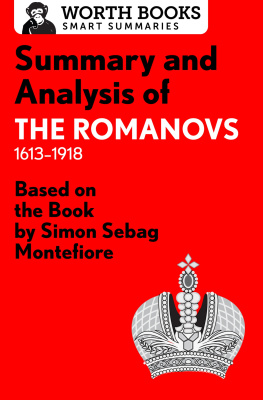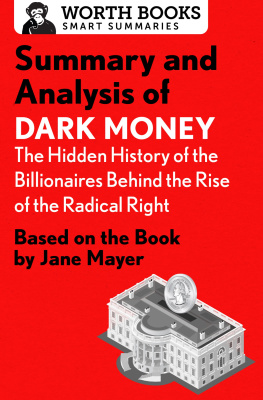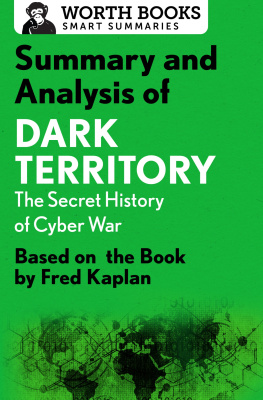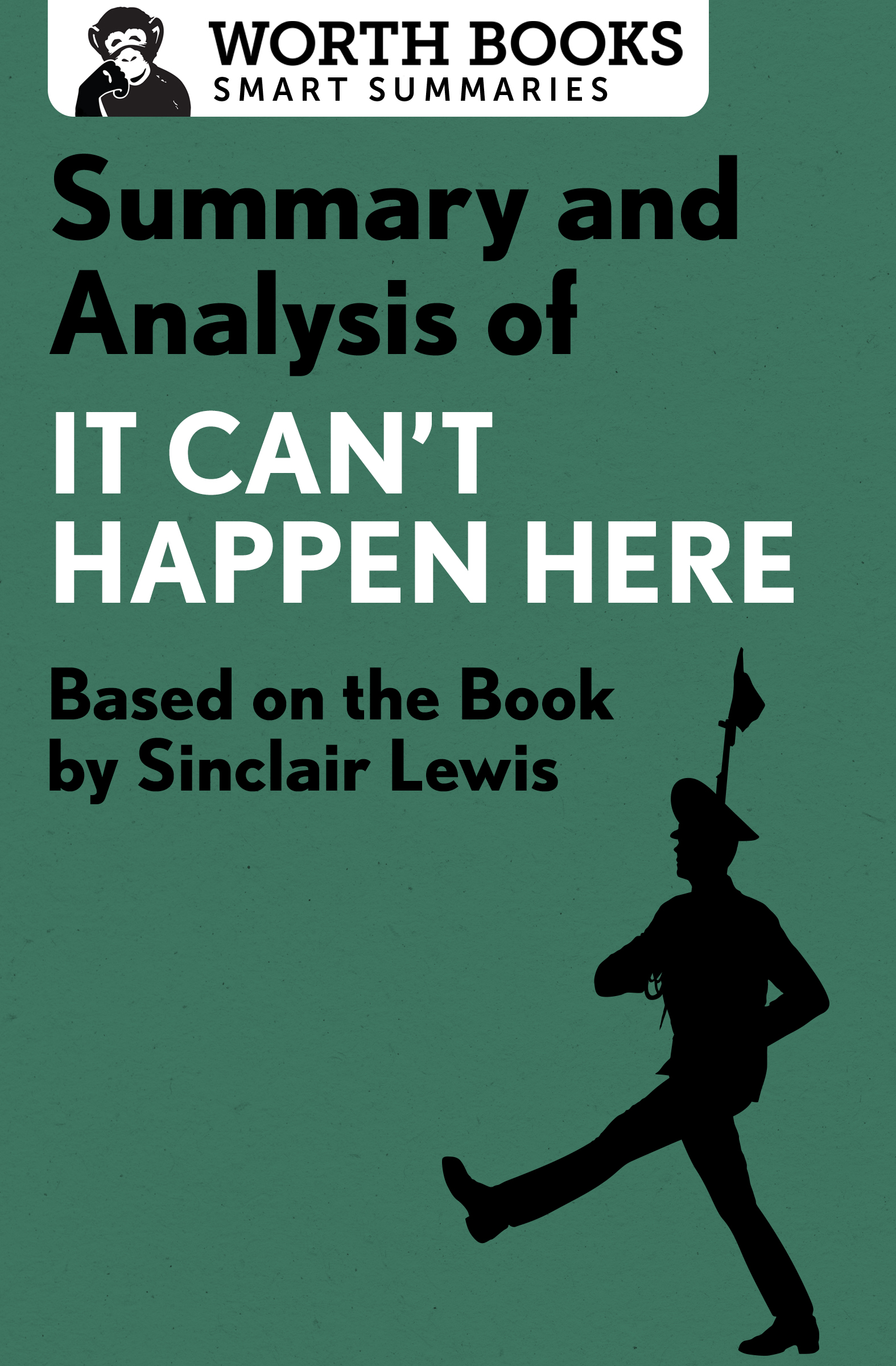Summary and Analysis of
It Cant Happen Here
Based on the Book by Sinclair Lewis

Contents
Context
Sinclair Lewis wrote It Cant Happen Here in 1935, during the Great Depression, when the American political climate was shifting toward extremism. Economic upheaval, both at home and abroad, had populations embracing smoke-and-mirrors solutions to their problems. The pro-Nazi German American Bund (or German American Federation) had some 10,000 members, while the anti-Semitic Silver Legion (whose members wore silver shirts, reminiscent of Germanys Brown Shirts) had spread across the country. There was an assassination plot against President Franklin Delano Roosevelt in 1933, and other novelists had written their own cautionary tales, including A Cool Million by Nathanael West and Those Who Perish by Edward Dahlberg, both in 1934.
To a large degree, Lewiss satirical work responded to a fear in the United States that powerful figures like radio priest Charles Coughlin in Michigan, and Senator Huey Long in Louisiana, would together fuel a dangerous American-style populism. (Long, a Democrat nicknamed The Kingfish, had maintained he would challenge FDR, whom he once supported, in the 1936 presidential election.) Although Lewis was not especially political, he was alarmed by extremism. The book features a large cast of characters, and, at the time it was published, many of its readers looked forand foundthinly veiled versions of real-life figures among them.
Just weeks after Lewis finished the novel, Long was assassinated at the Louisiana State Capitol. Although any Long usurpation of the White House was now moot, public interest in populist schemes and promises remained high. Lewiss cautionary tale about the danger of fascismand the fragility of democracystill draws readers in todays fraught political climate. After Donald J. Trumps inauguration in 2017, It Cant Happen Here became an instant bestseller: the novel that foreshadowed Donald Trumps authoritarian appeal ( Salon ). Lewis and John C. Moffitt wrote a stage version of It Cant Happen Here that, nearly 80 years later, continues to be produced.
Overview
The year is 1936, and the United States is preparing for a new presidential election. In Fort Beulah, Vermont, local residents find themselves taking sides in a wave of populism that will pit the honest but uninspiring Republican candidate, Senator Walt Trowbridge, against a charismatic Democrat, Berzelius Buzz Windrip, who promises $5,000 to every American citizen. Central to Windrips campaign is his book, Zero Hour, which makes confused and contradictory claims and promises but carries something that appeals to everyone.
Protagonist Doremus Jessup, the local newspaper editor, is troubled by the political campaign. His wife Emma is loving but not a deep thinker, and she is mostly disengaged from the political developments around her. The couples offspringMary (married to a successful doctor in town and mother of a young son); high-energy uncensored Sissy (courted by Julian Falck, grandson of the local Episcopalian minister); and ambitious lawyer Philipeach experience the impact of the political shift in different ways.
Doremus is fearful after Windrip, backed by a powerful radio minister with a large following, stages an upset win at the polls. What follows reads like a playbook for the rise of a fascist state. The Congress is co-opted, the Supreme Court is made powerless, and a new regime, known as the Corpo, reorganizes the country.
Windrip launches a government whose ambitious cabinet members and officials are not prepared for the offices they hold, among them local industrialist Frank Tasbrough, Doremuss former classmate. Even Doremuss former handyman, the loutish Shad Ledue, rises rapidly through the brutal ranks of Windrips paramilitary, the Minute Men. The Minute Men begin a chilling campaign of terrorism and murder, first singling out Jews and those who speak out in opposition to the Corpo. Education is attacked. People start to go hungry.
Doremus and friends work for the resistance until Doremus is brutally beaten and sent to a concentration camp. With help from his paramour Lorinda Pike, he escapes to exile in Canada where he works for Trowbridges New Underground.
Within the Corpo power structure, there is constant scheming. A coup scheme ousts Windrip, who goes into exile in France (along with the money he has embezzled during his reign). Then his decadent successor is murdered. Finally, the rigid secretary of war, Dewey Haik, takes power and leads the country into a trumped-up, patriotic war with Mexico. Doremus returns to the United States to help on-the-ground resistance efforts to bring Trowbridge to power and end the madness.
Cast of Characters
Julian Falck: The grandson of the local Episcopal minister, and a suitor of Sissy Jessup. He is blond and wiry, neat and polite, and mild-mannered. After his parents died, he was raised by his grandfather, an Episcopal minister with the same name. Under the Corpo regime, Falck courageously infiltrates the ranks of the brutal Minute Men.
Adelaide Tarr Gimmitch: A raging member of the Daughters of the American Revolution who campaigns tirelessly for her moral beliefs, including Prohibition, taking women out of the workforce and putting them back into the home, and film censorship. She is based on the real life Elizabeth Eloise Kirkpatrick Dilling.
Fowler Greenhill: A happy and hustling redhead, and one of Beulah Valleys physicians, Greenhill is married to Mary, Doremus and Emma Jessups oldest daughter. The Greenhills have a young son, David. Greenhill pays a steep price for protesting the arrest of his father-in-law.
Mary Greenhill: The daughter of Doremus and his wife, Emma. She is at first an organized, well-heeled wife of Dr. Fowler Greenhill. But her husbands summary execution turns her into an avenger.
Dewey Haik: The congressman who nominated Berzelius Buzz Windrip as a presidential candidate at their partys convention. He is an old-fashioned, grim, and rigid military man and a religious fundamentalist. Under the Corpo regime, he rises to the position of secretary of war. He eventually takes control of the country after Windrip is deposed and his successor, Lee Sarason, is assassinated. A stickler about discipline, Haik leads the country into a war with Mexico.
Cecilia Sissy Jessup: Jessup and Emma Doremus youngest daughter, 18 years old, with a lighthearted and outspoken nature. She is in her final year of high school, aspiring to become an architect, and chatters about future wealth and romance, when Windrips regime takes power. She and her fianc Julian Falck become activists in the resistance.
Doremus Jessup: The books protagonist and editor of a newspaper in Fort Beulah, Vermont. He is a liberal thinker and usually passiveuntil cornered and pushed. He first responds to the chilling actions of the Corpo by writing about it. But as censorship of the press kicks in, his knowledge of the Corpo governments power and brutality sweeps him into the New Underground, a resistance movement. He pays dearly for that decision but sees no alternative.
Emma Jessup: Doremus Jessups wife is a kind woman and a homebody without great intellectual depth. As her husband struggles to find an effective way to resist the tyranny of the ruthless new government, she goes about her daily life little affected.
Philip Jessup: Doremuss oldest son, a graduate of Dartmouth College and Harvard Law School, is 30 years old, married to Merilla, and is ambitiously practicing law. Rather than fight the Corpo, he is co-opted.









